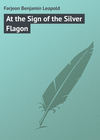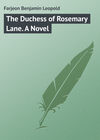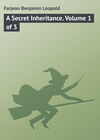Buch lesen: «Joshua Marvel», Seite 32
"Bravely done," said Rough-and-Ready to Minnie. "Whatever notion they have in their heads, it is one that will do us no harm. See, they are moving off, taking the sailmaker with them."
And, indeed, the natives went away in a body, leaving behind them four of their party, however, who squatted upon the ground, with their eyes fixed upon the castaways.
"They are left to watch us," said Rough-and-Ready; "but I think we may make ourselves easy about their being disposed to be friendly."
He and Joshua went about their pursuits as usual; but to keep up the fiction concerning Minnie with the natives who were watching them, they would not allow her to work, and treated her with such marks of deference as could not fail to impress the savages. During the day, Rough-and-Ready offered food to the savages, who accepted it. To show their gratitude, two of them went away into the forest, and returned with a quantity of honey in a reed basket, which they placed at Minnie's feet, and which she partook of to their evident satisfaction.
"There isn't the slightest mistake," said Rough-and-Ready merrily, "that the devil isn't half so black as he is painted."
They were left apparently undisturbed for two days, when the natives returned, with different descriptions of food-sweet roots many of them, pleasant and good to eat. "They have some plan in their heads," said Rough-and-Ready. He was right. Early the next morning the natives gave them to understand that they were going farther inland, and that the white people were to accompany them. "Now we shall see something," observed Rough-and-Ready as they plunged into the forest. They walked for three days before they came to the native camp. They made short stages to accommodate Minnie. During this time, Minnie kept close to Joshua, as if to protect him; but Rough-and-Ready mixed freely with the natives, and made some snares for game, which he gave to them, and with which they were much pleased. When they were within a few miles of the camp a number of the tribe, chiefly women and children, came out to meet them. Soon they arrived at the camp, and were surprised at its picturesqueness. It consisted of about a dozen roomy huts, roofed and thatched with bark and reeds. At a short distance from the huts was a large pool, the vegetation around which was singularly beautiful. Among the strange trees which attracted the notice of the castaways, the umbrella-tree, with its dark loaves and crimson flowers, seemed to them the most remarkable. There were also a large number of great fig-trees, and magnificent palms with feathery leaves. The air was sweet with the perfume of lily and jasmine and the golden-flowered thorn. There was one hut which appeared but newly built; it was prettier than the others, and its sides were decorated with wild flowers and flowering vines. Towards this the natives led Minnie, upon whom the women and children looked in awe and wonder. She, clasping Joshua's hand, entered this hut, and sank upon the bed of dry leaves, wondering what was next to come. She begged Joshua to stop with her, for she was frightened of being left alone. So, after partaking of the food which the natives brought to them, he lay down near the mouth of the hut, and she at the farther end on her bed of leaves. Joshua could see the glories of the sunset from where he lay; and he saw the fire die out of the sky, and saw the stars come out. But he was tired with his day's walk, and sleep overpowered him, although he tried to keep awake. Early in the morning they rose, and walked towards the banks of the pool, -
"To where the weed of green and red
Its floating carpet gayly spread,
Whereon the emerald frog reclined,
Fanned by the fragrance of the wind;
And all was darkened by the shade
The water-weeping branches made-
Save where a paler, tenderer green
Made bright the beauty of the scene.
The birds flashed down, to drink or lave,
With varied note and joyous stave,
And plunging sidelong from the reeds,
That wavered mid the water-weeds.
Plashed in the stream so cool and calm,
O'erhung by many a fern-tree palm;
And bell-bird peels, whose silvery chimes
Found in the rippled water rhymes,
Throughout the perfumed thicket rang,
Whence the tall-headed bulrush sprang."
CHAPTER XXXVI
THE POWER OF MUSIC
The natives were busy preparing for a grand Correboree, which, being interpreted, means a grand gathering and celebration in honor of some imposing event. Scouts were sent out in every direction, and every hour brought fresh comers, who evinced the greatest possible curiosity in the white people. At one time nearly sixty members of a different tribe arrived in a body, and a fierce jabbering took place between the old men of the tribes. Rough-and-Ready, who had by this time picked up a few native words, came to Minnie and Joshua with a look of concern on his face.
"They are quarrelling about us," he said. "As far as I can understand, this new tribe lay claim to us for having been found in a country which they say is theirs. I think I know how they will settle it, if they settle it at all peaceably."
"How?" asked Joshua anxiously.
"They will separate us-two for each of the two strongest tribes." Minnie caught Joshua's hand convulsively. "I know what you mean, my dear," said Rough-and-Ready, a little sadly; "you and Joshua must not be parted. And indeed, it would not be right; you belong to one another. Well, the sailmaker and I will go our way and you will go yours. Only you must be cunning and keep together. Joshua, tonight, before the natives go to sleep, play a few soft airs upon your accordion. You and Minnie must be in your hut together while you play. And don't let them see the accordion. The music will fill them with wonder, and it will be a strong reason with them why you should not be parted. But indeed, my dear, if you continue to act your part well there will be no fear of that."
"You are a good man," said Minnie gratefully, holding out her hand to Rough-and-Ready.
He took it and pressed it to his lips, and held it in his with infinite tenderness.
"No, my dear," he said, "I am not a good man. You have seen me at my best. I am a convict, and when I came on board the 'Merry Andrew,' I was trying to escape from the colony. There's many a black mark against me which I doubt will never be wiped out in this world. I was a little sinned against at first, it is true, but I had my revenge afterwards; I couldn't be meek and humble under undeserved punishment. There! that's all I shall tell you about myself. Your imagination must fill in the outlines. And, mind you! you can't make me out worse than I am. I am glad I have made this confession, lame and bald as it is; it has relieved my mind." He turned his back to them, with a motion which said, "You see what a vagabond I am; I am not fit company for such as you."
But Minnie laid one hand upon his shoulder, and with the other turned his face towards hers.
"You are a good man," she repeated earnestly, looking into his eyes, which were filled with tears, "and I honor and respect you."
"And I, too," said Joshua, grasping his hand heartily. "If it should be our good fortune to meet under happier circumstances than these, I will show my gratitude to you."
"There, there, there!" exclaimed Rough-and-Ready, half roughly, half tenderly; "enough said about the past. We sha'n't be together much longer, as I've told you, and as you'll soon find. We must take things as they come, and make the best of them. Do you know the natives have a curious fancy about you?" he said to Minnie. "There was once in their tribe a young woman of rare beauty and virtues, who was idolized by all I don't know how long ago this was, and it is only by piecing stray words and actions together that I have been able to understand it. Well, this young woman, by some means or other, was transformed into a star. They believe you to be her, having taken mortal form again to visit them. 'Tis a pretty fancy, isn't it?"
"But I am white, and" -
"She was black," interrupted Rough-and-Ready gayly. "That is easily accounted for; they believe that when they die they jump up white. If you were of their color, they would not have the fancy about you."
By the evening there were not less than a hundred and fifty savages collected together. Although the weather was warm, they were lying down before their campfires, with the exception of one group of about twenty old men and doctors of the principal tribes, who were earnestly engaged in discussing matters relating to the white people. An old chief of the tribe who had first discovered the castaways was on his feet, declaiming violently, with extravagant action, in which, nevertheless, there was much dignity. Opara was his name. His hair and beard were white, and his face and body were scored with ugly seams gained in battle, or in the exercise of the strange rites and ceremonies of his tribe. On his neck and breast, and from his shoulders to his hips, were still to be seen, old as he was, the gashes made in his youth to entitle him to the dignity of manhood. A great chief was Opara-wise in council, fearless in battle and had been the most skilful of all his tribe with boomerang and spear, and middla, and in throwing the wirra.
"The strangers are ours," he said; "the sacred crow, Karakorok, witnesseth that they are ours by right. The heavens were filled with light, and great voices thundered. We listened in awe. Fire rent the mountains, and made new caverns sacred. Light dived into raging waterfalls, cutting the earth. We waited full a moon. The storm ceased; the spirits spoke no more. We waited another moon. The stars fell near the sea-into it. We went there, wanting to know. We brought the strangers back. They are ours."
Up rose Wealberrin, chief of the other tribe. No less famous he than Opara. White-bearded, too, and tattooed from top to toe, and no less cunning with war and hunting weapons. Around his waist was a belt made of the hair of the enemies he had slain in battle.
"Not so," he said. "The land is ours. There, in Pandarri Kurto (heaven's cavern), lie our mintapas-our doctors. There are our hunting-grounds-our fishing-lands. There we make men of our sons. Shall I take Opara's food, and call it mine by right? He would reply as becomes a warrior. If I ask, he would give. But I ask not now. The land is ours. What is found on the land is ours."
"Once lived Mirgabeen," said Opara. "Bright-eyed, fleet-footed, hollow-backed. Her tongue spoke the music of the birds. Her dark hair hung down to her arched feet. She could shroud her glory in it-as night the day. She was beloved by all. Too bright for earth, she lives in the heavens now, a star. She looks down on me. She hears me speak. So dwelt with us a maid, whose supple limbs cleaved the water, who sang the music of the woods. The trees bent to her as she walked. The branches bowed before her, and whispered to her, and she replied. She left us for the grand vault where moons are made. What was ours is ours. She has come back to us. She is ours."
"So be it," said Wealberrin. "The others then are ours. Opara has spoken."
"She has with her a mate," said Opara, "whom she has touched upon the breast. Let Wealberrin take two-we two. Then we shall have peace."
Wealberrin would have replied, but as he rose to his feet a wondering expression stole into his face, and into the faces of all assembled there. For from Minnie's gunyah issued sounds so soft and sweet that the night-birds hushed their voices to listen. The breeze was so light that the melodious notes hung upon the air, and lingered long before they died away. The savages clutched each other, and stood transfixed with fear and wonder. What voices were these that were speaking? In their dreams they had never heard any thing so sweet. Opara had said it. Minnie had come from the vault where the moons are made, and was speaking to the spirits of another world. Motionless, with bended heads or with forms inclined towards the sound, they stood like figures of stone, in reverential attitude. And did not move a limb when the music ceased; for a shadow fell upon the moonlit space, and Minnie came to the opening of the gunyah and looked in dumb amazement at the strange scene before her.
And now the day has come upon which the grand ceremony of the Corroboree is to be celebrated. The rival tribes have settled their dispute. Rough-and-Ready, who is the Chorus of the party, tells his friends that Joshua and Minnie are to remain with Opara's tribe, and that he and the sailmaker are to be attached to Wealberrin's. Joshua hints at resistance, but Rough-and-Ready declares it would be madness.
"If there was no woman in the case," he says, "I might counsel differently; but for Minnie's sake we must have no fighting. We might kill a score or two of the natives, but you must bear in mind there are half a thousand of them here now. Then their spears are poisoned. Suppose one should strike Minnie. No, no; submission is our best course." So, with much grief, they are compelled to make up their minds to submit.
All day long, there is great feasting. An emeu has been hunted down, and the fat carefully distributed among the natives; honey and sweet roots have been brought in in abundance, and the bushes have been stripped of their fruit. Rude seats of vines, decorated with flowers, have been placed for Minnie and Joshua in front of their gunyah, and in front of the seats a kind of arched screen of leaves and branches has been erected, through the network of which they can see and be seen. When night comes, fires are lighted, the flickering flames of which give birth to monstrous shadows that flit about the trees, and fill the woods with grotesque shapes. Minnie and Joshua watch with a kind of wonder the shadows created by the fire nearest to them. Now the light goes down, and the black shapes dart through the woods, or run swiftly along the branches, ravenously, and with cruel intent, as it appears; anon, the flame leaps up, and the shadows fly and shift restlessly about, with lightning speed, as if suddenly surprised by an enemy. Their attention, however, is soon diverted from these inanimate creations. The natives are assembling. Men, women, and children troop in from all quarters, and seat themselves round and about the fires in somewhat orderly fashion. There cannot be less than five or six hundred of them. All being seated, a long silence ensues, broken at length by a circle of singers, who chant a monotonous song, narrating how they had journeyed towards the sea into which stars were falling, and how they had found the strangers, and brought them to their camp. As they sing this song over and over again, they beat time with their clubs. A brave then chants a tradition of one of their ancient chiefs, who was compelled to fly before a hostile tribe; all his young warriors were slain, and he alone escaped; but his enemies determined to put an end to him, set fire to the bush around him, and he was encircled by a net of flame. Suddenly the earth opened, and water stole up from the caverns and extinguished the fire, and so the chief was saved, and a great river was made, in which fish was plentiful. In the midst of the silence which follows this song, a man springs from out the shadows. His face is crossed with lines of red and yellow, and his body is painted white. In his hand is a branch of green leaves, and a great tuft of emeu-feathers is on his head. He stands perfectly still for full a quarter of an hour, looking into the sky for the spirits of dead men. What inspiration falls upon him at the end of that time it would probably be difficult to explain; but he waves his branch of green leaves to and fro, and the singers strike up another song, and the musicians beat time as before with their war-clubs, while the chief actor in the scene rushes about, and flourishes his arms in a gradually-worked-up state of the wildest excitement. He vanishes in the shade as suddenly as he had appeared, and in his place leap a dozen men, presenting so startling an appearance that Minnie clasps Joshua's hand in sudden alarm. Flowers are twined round their ankles and above their knees. Some have tails or dingoes wound about their heads, others wreaths of down from the white cockatoo; some have tails of wallabies attached to their peaked beards, and all have feathers in their hair. White rings are round their eyes, their noses are striped, and lines of red, yellow, and black are painted from their shoulders and breasts down to their waists, where a white ring encircles them. The singers burst into song again, and the hideously-decorated figures begin to dance, advancing towards the singers and retreating from them; their motions at first are slow and tremulous, but soon they are leaping and jumping frantically from side to side, each trying to out-tire the others, with such violent exertion as to cause them presently to fall upon the ground in a state of exhaustion. As soon as each recovers, he rises, and dances by himself, and the women utter cries of commendation, and beat the ground in ecstasy. These performers are followed by others, who dance in a serpentine line, until they present the appearance of a serpent coiling and uncoiling itself; as they dance, they make a hissing sound with their tongues, to imitate the hissing of a serpent. And so through the night the Corroboree continues, until, thoroughly worn out, the savages retire to their rest, and the woods that a while ago were filled with such strange life and sound, are lying quiet and solemn in the peaceful light of the stars.
Wealberrin and his tribe are ready to start, and Rough-and-Ready and the sailmaker have come to wish Minnie and Joshua good-by. They go into the woods, out of sight of the natives, and sit sadly upon trunks of trees that have been blown down by storms.
"I have heard say, or have read somewhere," says Rough-and-Ready, striving to speak gayly, "that life is made up of meetings and partings, so that this is quite a natural thing, and not to be repined at. What we've got to do is to make the best of things."
"It might be worse," says Tom the sailmaker, good-naturedly assisting Rough-and-Ready to cheer Minnie's spirits.
"Bravo, Tom!" exclaims Rough-and-Ready. "It might be a good deal worse. We have escaped greater dangers than the present one, and if we act wisely and bravely we shall escape this. But it all depends upon ourselves, and if we lose courage, we lose all. You must bear that in mind, my dear. Why, this day twelve months we may be talking together, and smiling at these experiences which now seem so hard to bear!"
But Minnie only smiles sadly in reply, and Joshua asks Rough-and-Ready if there is any thing they can give him to enable him to bear them in remembrance.
"Nothing is needed," replies Rough-and-Ready. "We have not been together for a very long time, but our acquaintanceship has been sufficiently eventful to cause us never to be able to forget each other. Yet I should like one thing," with a tender glance at Minnie.
"What?" she asks, learning by his look that it is something in her power to give.
"A piece of your hair, Minnie," he says.
Minnie desires Joshua to cut off a lock with his knife, and he cuts a thick tress and gives it to Rough-and-Ready, who winds it round his finger and puts it into his pocket.
"Now," says he, "for a little sensible talk. Your sole aim must be to endeavor to work your way near to the settled districts, where you may have the chance of falling in with white people. Southward lies your chance of being rescued. Every day the squatters are coming farther inland in search of new ground for cattle-stations, and every day this fresh opening up of the country adds to the chances of escape. Whosesoever lot it is to first fall in with our countrymen must tell them that there are two white people living with one of the native tribes who are desirous of getting into civilized company again. That will make them look out for us perhaps. You will find that stockmen and bushmen are as fine and manly a set of fellows as you would desire to meet. I think you have the best chance of first hearing the crack of a stockman's whip, for your tribe is more of a southern one than ours." Then Rough-and-Ready told them, as much for the purpose of diverting Minnie's attention from the sad parting near at hand as for any other, of the wonderful enterprise of the Australian pioneers of progress, of the dangers they cheerfully encounter, of the unknown country they bravely plunge into, of the hardships they bear and make light of, and of the grand future that awaits the beautiful Australian continent.
"To my thinking," he says with enthusiasm, "there is no life that contains so much pure enjoyment as the life of a backwoodsman. I would not change it for any other-only I would prefer, for occasional mates and companions, white people instead of savages. I don't believe man was intended to live in close cities."
"But even such a life as you describe," says Joshua, "leads to the making of great cities. The pioneers go first, and the masses follow."
"That's the worst of it," says Rough-and-Ready; "they follow, and are not content to live naturally. They make streets and cramp them up with just room enough for a score of men to walk abreast in. Down in Sydney there are streets, as you know, where not a half a dozen men could walk abreast through; but that's the way of all cities, large or small. Directly new land is opened up, in troop the masses, as you call them, who make their streets and build their houses as if there wasn't an inch of ground to spare; while all around them are thousands and thousands of miles of lovely country, with trees and flowers, and fruit, and fish, and game, inviting them to come and enjoy life as it ought to be enjoyed!"
"Well," says Joshua, "'tis the way of the world. You were never intended to live in cities, that's clear."
"I don't know. I dare say, once upon a time, I should have thought I was mad if such ideas as I have now had entered my head. I wasn't always so rough as I am now. But cities are necessary, I suppose; and it's folly to talk as I do. Why, I don't doubt that in less than fifty years a city will be built even here in these wild woods; and perhaps on this very spot where we now sit they'll build a prison." He speaks these last words with a dash of bitterness: but he soon shakes off his cynical humor, and proceeds to speak of more important matters concerning the present. "Be especially careful of one thing," he concludes, "never by any chance let them see your accordion." (Joshua had it slung round his shoulders, wrapped in a bag of fur which Minnie had made for it.) "When you play, let the natives hear the music, not see where it comes from. By that means you will best preserve your influence and Minnie's over them. And bear in mind-work southward."
Here two natives make their appearance, and after looking attentively at the white people, glide away quietly.
"'Tis time to go," says Rough-and-Ready, jumping to his feet; "that is their delicate way of telling us that they are waiting." Minnie, with streaming eyes, raises her face to his. He stoops and kisses her, and says tenderly, "God bless and protect you, my dear!" The four of them shake hands sorrowfully, and part-never again to meet on earth. So Rough-and-Ready and Tom the sailmaker disappear from the yearning gaze of their friends, and from this story; and Joshua and Minnie are left thus strangely alone.




















